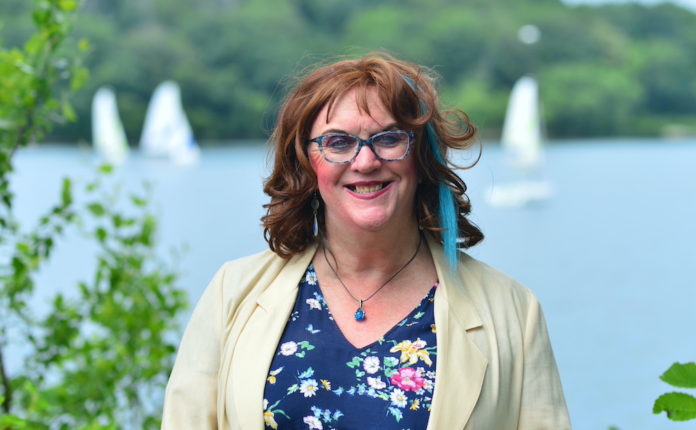[This column appears in the September/October 2021 issue of Boston Spirit magazine. Subscribe for free today.]
Gabi Morgan, 65, from Jamaica Plain is becoming a fixture not only in her own community of JP but also with older trans and gender diverse adults across Massachusetts. Gabi is the manager at Fenway’s Boomerangs and is the friendly face so many count on when they come into the store. She is also the first point of contact for many transgender and gender diverse older adults through her role as the engagement specialist with the LGBTQIA+ Aging Project. This is exactly what Gabi wanted: “I wanted to be the person I never had.” It took nearly 60 years, through alcoholism and several suicide attempts, before she was at a place in her life when she was ready to allow her authentic self to come forward. She did this all on her own and now she vows to help as many older adults as possible with their own journey.
For many people, it is hard to remember feelings of identity or gender when we were children, yet for Gabi those memories are very distinct. In the ’60s, kindergarten activities were often segregated; boys would go to one side of the room and girls on the other. She knew back then something didn’t feel right, and she clearly remembers wishing that her teachers could “just see inside her” to know.
A pivotal moment occurred when Gabi was around six years old. She saw a female impersonator and was instantly aware of two things: that she wasn’t like “that” and that she didn’t want to put on a dress “just for pretend.” But from an early age, Gabi learned to keep these feelings a secret. At one point when she was growing up, her mother noticed she had remnants of makeup on and that caused her mother to say, “I love you, I am proud of you, but don’t ever become a sissy.” Her mother clearly sent the message that it was not okay for boys to wear makeup.
Moments like these created such pain and confusion. When she was 10 years old, she drank a glass of whiskey that was left out at home. For the first time it took the edge off the growing anxiety around her gender, and she was able to sleep at night. The alcohol tasted terrible, but if it made these crazy feelings more bearable; she needed that. This was the beginning of decades of alcoholism. The drinking continued. As Gabi entered her 20s she felt that if she drank a lot and slept with a lot of women, those crazy feelings of wanting to be a woman would disappear. It didn’t work, even when she drank more.
The alcohol abuse led her to Alcoholics Anonymous. It was at one of those meetings when a life-changing moment occurred. A woman got up to share her story, but a man’s voice came out. Gabi realized for the first time that this woman who lived inside of her needed an identity. Two nights later, she was watching a late-night mystery show on TV when a woman stepped into the film-noir scene and said, “Hello, I am Gabrielle, but my friends call me Gabi.” She said to herself that night that no one will ever know this but at least I have an identity now. “I am Gabi.”
Around this time, Gabi noticed ads in The Boston Phoenix for a meeting place for cross dressers. At this point she had never appeared publicly as Gabi. She was only known by her colleagues as a man who was a restaurant manager for Houlihan’s. When the time came to attend the event for the Tiffany Club, now called Trans Club of New England, she gathered the dress she had picked out, her makeup and everything else she needed — she called it putting “Gabi in a bag” — and drove off to the club in Waltham. When she got there, she was filled with such fear she turned her car around and drove home. It wasn’t Gabi’s time.
That event caused a bit of a setback and she tried to ignore those “crazy feelings.” She moved to Maine and started a new career in radio as a DJ and a sportscaster. Again, she felt if she got married and had children those feelings of being a woman would go away.
In 1998, Gabi married and she and her wife tried to have children but unfortunately had a series of miscarriages. On top of that, the feelings of wanting to be a woman didn’t go away and her drinking returned. They divorced in 2005 and Gabi returned to Boston in 2012. At this point, her drinking was really bad and she was losing the will to live. She had a daily wish that she just wouldn’t wake up in the morning.
This continued for several years until a special moment in 2015. A woman she had become close with sensed something, and one evening, out of the blue, she said, “So what important thing do you feel you need to tell me about?” Gabi put her head on this woman’s shoulder, began to cry and said, “I am a woman.” Her friend didn’t bat an eye and said, “Great, do you have a name?”
This was a pivotal moment, but unfortunately it left Gabi feeling overwhelmed with emotions. She didn’t know how to receive all that happiness and she also didn’t know how to move forward with what needed to be done. She attempted suicide shortly after she came out to her friend. But then in the hospital in the days after her attempt, she told a nurse her story. That nurse went out and bought nail polish and would sit with Gabi teaching her how to paint her nails. No one had taught her anything about how to be a woman, and this nurse was doing it out of love.
Those two moments of connection, compassion and support with her friend and her nurse gave Gabi the courage to begin her transition. The following week, Gabi pierced her ears, bought a woman’s scarf and began wearing makeup. She felt at this time that she needed to shout out to everyone, “Get out of my way because Gabi is coming through. She has waited nearly 60 years; now it is her time to live.”
At this point in her life, she began telling a select group of friends, but after a while it became too difficult to keep track of who she told. In February of 2016, Gabi came out publicly on Facebook and in May of that year she appeared in person as Gabi for the first time in public at the first Transgender Flag Raising at City Hall.
The timeline for people transitioning is different for everyone. In Gabi’s case, she slowed the process down a bit once she began her hormone treatment. She had to find out on her own how to walk, talk and dress like a woman. During this time, she also made the commitment to address her alcoholism. This time, she was able to attend an all-women’s 12-step group, which greatly added to her success.
When the time came to begin the medical procedures, the world was in the middle of a global pandemic, but that didn’t stop Gabi. She’d waited 60 years for this and wasn’t about to wait any longer. In 2020, Gabi underwent top surgery, gender affirmation surgery and facial feminization.
Once Gabi’s physical transformation was complete, she felt an overwhelming sense of gratitude for the support she received from her Trans Health team at Fenway and the Boston Medical Center. Coincidentally, at that time, someone forwarded to her a posting for a transgender engagement specialist for older trans adults with the LGBTQIA+ Aging Project, and Gabi knew this was meant for her.
Now Gabi is able to be the coach and moral support for other older trans adults that she’d wished she had. Since joining the LGBT Aging Project in this new role in the spring of 2021, Gabi has had the opportunity to connect with dozens of older adults across the state who are trying to find their own way through this process. The issues are different for each one of them; some are trying to come out to their spouses or children, others are just trying to figure out who they can turn to for advice. One person from a very rural community in Central Mass wrote to Gabi asking scores of questions. They ended their email with the words “Help me Obi-Wan Kenobi, you are my only hope,” which underscores the value and urgency of the work she is now undertaking.
Even though each person Gabi helps has a different set of circumstances, there is one question she is asked from nearly everyone. They all want to know if she has any regrets that she didn’t transition when she was younger. Gabi tells them all the same thing: Of course she would have loved to be a pretty young girl instead of entering womanhood at 60. But right now, she is so proud of the work she is doing. Gabi believes that if the whole transition had been easier and done when she was younger, she doesn’t think she would have had the same commitment and drive to help people. That came from having to find her own way by herself. She came out when she was supposed to. No regrets. Just Gabi.
The LGBTQIA+ Aging Project is engaging transgender and gender diverse people age 50+ to build community, understand your needs and develop programs of interest to you. Gabi would love to hear from you, wherever you are on your journey. Contact Gabi Morgan at gmorgan@fenwayhealth.org.
Bob Linscott is assistant director of the LGBTQIA+ Aging Project at The Fenway Institute.
Not a subscriber? Sign up today for a free subscription to Boston Spirit magazine, New England’s premier LGBT magazine. We will send you a copy of Boston Spirit 6 times per year and we never sell/rent our subscriber information. Click HERE to sign up!









